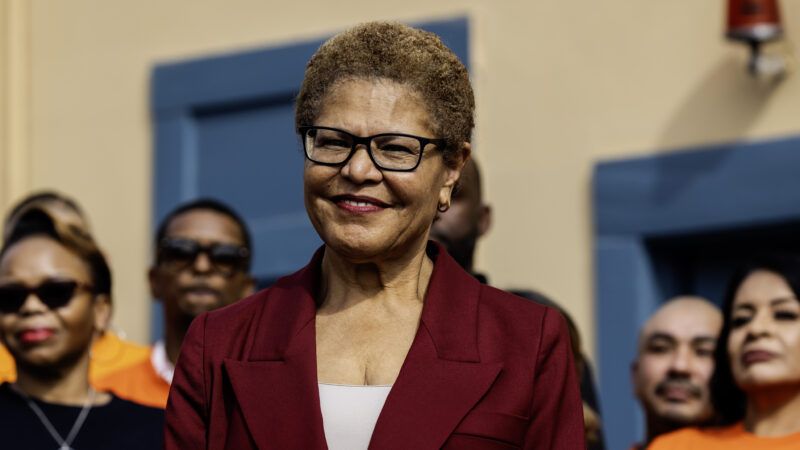California Squeezes Private Money Out of Wildfire Rebuilding Efforts
Needless regulation on fire insurance, "speculators," and duplexes means fewer dollars are going to rebuild Los Angeles.

California Democrats are incensed at Congressional Republicans' musings that they might condition federal aid to Los Angeles fire victims on the state making policy changes relating to forest management and water infrastructure.
Yet many of California's own policies, both those on the books pre-disaster and those adopted after the fire, are already at work limiting the amount of private money that could be flowing to rebuilding efforts—leaving homeowners more dependent on those potentially politicized federal funds.
This is most obviously the case with the state's decades-old, voter-approved insurance regulations.
As Reason covered last week, these have prevented insurers from accurately pricing the risk of wildfires into the premiums they charge homeowners. More recent regulations also require insurers to issue and renew policies in wildfire-affected areas.
The result is that the state's largest insurers have scaled back their business in the state, including by canceling thousands of policies in communities that have since been devastated by this year's fires.
That means at least some homeowners will be left trying to find the funds to rebuild their destroyed homes without any hope of an insurance check coming their way. Others on the state-managed, privately funded FAIR plans—which caps coverage at $3 million—may well receive payouts that don't cover the full cost of rebuilding their homes.
To make matters worse, California Gov. Gavin Newsom has also issued an emergency order that bars developers and land buyers from making unsolicited "below-market" bids on fire-affected properties.
The intent of the order, according to Newsom, is to prevent speculators from exploiting homeowners who've lost everything in the fires. Its ultimate effect is to make life harder for cash-strapped homeowners who would want to sell their fire-damaged property and use the proceeds to start over.
Meanwhile, developers with the capital to actually rebuild those properties are being forced out of the market.
Newsom and Los Angeles Mayor Karen Bass, to their credit, have issued executive orders waiving regulations that in normal circumstances add time and expense to the process of obtaining needed building permits.
The governor has suspended the processes and permitting requirements found in the California Environmental Quality Act (CEQA) and the Coastal Act for fire-affected property owners trying to rebuild.
The intent and direction of that order are good. Builders have praised the governor's order as a sign of Newsom's commitment to rebuilding devastated communities, although the practical effects are likely limited. (Those laws' requirements would generally not be triggered by homeowners trying to rebuild from a fire.)
The mayor's order expediting the issuance of city building permits should have a more significant effect. But her order also comes with the biting restriction that expedited rebuilding projects can't involve adding additional units to a property or changing its use.
One could imagine that a property owner might want to take advantage of numerous state laws legalizing duplexes, lot splits, and accessory dwelling units, to add a new home or income-generating rental unit on their property to offset the costs of rebuilding.
But under Bass' order, only people building back roughly the exact same structure that was destroyed by fire can get fast-tracked permits. Someone wishing to rebuild their home and create one for someone else in the process will have to get in the back of the line.
Republicans' suggestion that they might condition federal aid to California on policy changes is eyebrow-raising in part because many of their suggested policy changes are federal policies to begin with.
Congress, not Gavin Newsom or Karen Bass, has the power to pare back federal restrictions on controlled burns on federal lands that could reduce future wildfire risk.
California policymakers are nevertheless doing themselves no favors by attaching so many of their own strings to the private money that could be going towards rebuilding Los Angeles' fire-stricken neighborhoods.
Rent Free is a weekly newsletter from Christian Britschgi on urbanism and the fight for less regulation, more housing, more property rights, and more freedom in America's cities.


Show Comments (10)